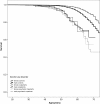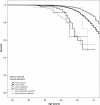Alcohol use disorder-related sick leave and mortality: a cohort study
- PMID: 23363536
- PMCID: PMC3565982
- DOI: 10.1186/1940-0640-8-3
Alcohol use disorder-related sick leave and mortality: a cohort study
Abstract
Background: Alcohol use disorders (AUDs) are associated with the highest all-cause mortality rates of all mental disorders. The majority of patients with AUDs never receive inpatient treatment for their AUD, and there is lack of data about their mortality risks despite their constituting the majority of those affected. Absenteeism from work (sick leave) due to an AUD likely signals worsening. In this study, we assessed whether AUD-related sick leave was associated with mortality in a cohort of workers in Germany.
Methods: 128,001 workers with health insurance were followed for a mean of 6.4 years. We examined the associations between 1) AUD-related sick leave managed on an outpatient basis and 2) AUD-related psychiatric inpatient treatment, and mortality using survival analysis, and Cox proportional hazard regression models (separately by sex) adjusted for age, education, and job code classification. We also stratified analyses by sick leave related to three groups of alcohol-related conditions (all determined by International Classification of Diseases 9th ed. (ICD-9) codes): alcohol abuse and dependence; alcohol-induced mental disorder; and alcohol-induced medical conditions.
Results: Outpatient-managed AUD-related sick leave was significantly associated with higher mortality (hazard ratio (HR) 2.90 (95% Confidence interval (CI) 2.24-3.75) for men, HR 5.83 (CI 2.90-11.75) for women). The magnitude of the association was similar for receipt of AUD-related psychiatric inpatient treatment (HR 3.2 (CI 2.76-3.78) for men, HR 6.5 (CI 4.41-9.47) for women). Compared to those without the conditions, higher mortality was observed consistently for outpatients and inpatients across the three groups of alcohol-related conditions. Those with alcohol-related medical conditions who had AUD-related psychiatric inpatient treatment appeared to have the highest mortality.
Conclusions: Alcohol use disorder-related sick leave as documented in health insurance records is associated with higher mortality. Such sick leave does not necessarily lead to any specific AUD treatment. Therefore, AUD-related sick leave might be used as a trigger for insurers to intervene by offering AUD treatment to patients to try to reduce their risk of death.
Figures



References
MeSH terms
LinkOut - more resources
Full Text Sources
Other Literature Sources

